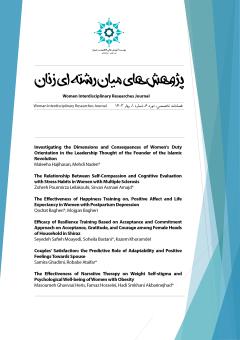Investigating the Dimensions and Consequences of Women's Duty Orientation in the Leadership Thought of the Founder of the Islamic Revolution
Subject Areas :Malihe Hajihasan 1 , Mahdi Naderi 2 *
1 - Doctoral student of political studies of the Islamic Revolution at Shahid University, Tehran, Iran.
2 - Professor of Political Science Department of Shahid University, Tehrab, Iran.
Keywords: Leadership of the Islamic Revolution's founder, women's Duty Orientation, Dimensions of Women's Duty, knowledge system of women.,
Abstract :
The synthesis of human "rights" and "duties" constitutes one of the most fundamental issues of human intellectual traditions, each striving to provide a coherent response through the establishment of a knowledgeable system. Within the intellectual framework of Imam Khomeini (RA) as the leader of the revolution, the concept of duty orientation forms the basis of pragmatism action, where societal happiness and prosperity hinge upon fulfilling one's duties. Specifically addressing the issue of women's duty orientation, he highlighted its various dimensions and implications. Given the pivotal role and identity of women in the ideology of the Islamic Revolution's founder, their duty orientation radiates prominently within their intellectual endeavors, portraying them as catalysts for the revival of thought and ideology. In Imam's task-oriented perspective removing women, who are creators of humanity, from human societies and nations, would lead to societal decline and failure. Therefore, understanding the dimensions and consequences of women's duty orientation in leadership thought is crucial for achieving societal happiness within the Islamic Revolution. This article aims to elucidate these dimensions and consequences in the framework of Imam Khomeini's leadership thought using a hermeneutic text-centered approach. The research seeks to answer the question: "What are the dimensions and consequences of women's duty orientation in the leadership thought of the founder of the Islamic Revolution?" The findings of the research indicate that women's commitment is anchored in the Imam's sevenfold thought: "Duty as the origin of action", "Duty is a universal matter", "The scope of duty and human capability", "The internal and rational aspects of duty", " The legitimacy of Islamic duty "Achieving absolute victory through fulfilling duty," and "The obligatory nature of duty". Therefore, the dimensions of women's responsibilities in the leadership thought of the revolution encompass religious, familial, economic, political, and scientific domains. Furthermore, the consequences of women's responsibilities in individual empowerment and societal cohesion, are grounded in the sacred teachings of Muhammad.
1- قرآن کریم.
2- نهج¬البلاغه.
3- احمدي طباطبايي، سيد محمدرضا(1387). اخلاق و سياست رويكردي اسلامي و تطبيقي. تهران: امام صادق .
4- امام خمینی، روحالله(1387). وصیت¬نامه امام خمینی. تهران: نشر فردوس.
5- امام خمینی، روح¬الله(1395). جایگاه زن در اندیشه امام خمینی. تهران: مؤسسه تنظیم و نشر آثار امام.
6- توحیدفام، محمد؛ و عیسی¬وند، لیلا(1389). فمینیسم و دموکراسی در گذر تاریخ. مطالعات روابط بینالملل، 3(13)، 25-56.
7- جمشیدی، محمدحسین(1384). اندیشه سیاسی امام خمینی. تهران: موسسه تنظیم و نشر آثار امام خمینی.
8- جوادی آملی، عبدالله(1385). حق و تکلیف در اسلام. قم: نشر اسرا.
9- حاجی¬حسن، ملیحه(1396). مطالعهي نقش و ابعاد رهبری امام خمینی در فرآیند انقلاب اسلامی. پایان¬نامه کارشناسی ارشد رشته جامعهشناسی انقلاب اسلامی، دانشگاه شاهد.
10- حريري، نجلا(1385). اصول و روشهاي پژوهش كيفي. تهران: دانشگاه آزاد اسلامي.
11- دباغ، سروش(1388). فضیلت¬گرایی در دیانت نتیجه¬گرایی در سیاست. روزنامه اعتماد، 27/01/1388.
12- سيد امامي، کاووس(1391). پژوهش در علوم سياسي (رويكردهاي اثباتگرا، تفسيري، و انتقادي. تهران: دانشگاه امام صادق و پژوهشكده مطالعات فرهنگي و اجتماعي وزارت علوم.
13- طغری¬نگار، حسن(1389). حقوق سیاسی - اجتماعی زنان قبل و بعد از پیروزی انقلاب اسلامی ایران. تهران: مرکز اسناد انقلاب اسلامی.
14- عارفی¬گوران، اسماعیل؛ و حاجی¬حسن، ملیحه(1398). چرایی علم¬اندوزی زنان مسلمان در عصر تمدن نوین اسلامی. هشتمین همایش الگوی اسلامی ایران پیشرفت، 2008-2026.
15- قزوینی، سید محمدکاظم(1389). زینب کبری از ولادت تا شهادت. ترجمه کاظم حاتمی طبری. قم: انتشارات همگرا.
16- کانت، ایمانوئل(1378). فلسفه اخلاق کانت. ترجمه منوچهر صانعی دره بیدی. تهران: انتشارات نقش و نگار.
17- کریمی¬نیا، محمدمهدی؛ جعفری، اکرم؛ بنواری، نسترن؛ و انصاری مقدم، مجتبی(1400). بازکاوی تطبیقی جایگاه زن در اندیشه امام خمینی و مقام معظم رهبری. پیشرفت¬های نوین در روانشناسی، علوم تربیتی و آموزش و پرورش، 4(36)، 172-187.
18- لاهیجی، حکیم فیاض(1372). گوهر مراد. تهران: وزارت ارشاد.
19- مجلسی، محمدباقر(1373). بحارالانوار. تهران: مکتبه الاسلامیه.
20- محمودي، سيد علي(1383). فلسفه سياسي كانت. تهران: نگاه معاصر.
21- مك¬ناب، ديويد اي(1394). روش تحقيق در علوم سياسي (رويكرد كيفي و كمي). ترجمه معاون پژوهش و تولید علم. تهران: دانشكده اطلاعات.
22- میرمؤمنی، زهرا سادات(1394). نقد جنبش فمینیسم و پیامدهای آن. پژوهشنامه نوین فقهی حقوقی زنان و خانواده، 2، 140-157.
23- نادری، مهدی؛ و حاجی¬حسن، ملیحه(1395). ابعاد نظری و عملی تکلیف¬گرایی در اندیشه سیاسی امام خمینی. فصلنامه رهیافت انقلاب اسلامی، 10(37)، 95-116.
24- هزاوهای، سید مرتضی؛ و سلطانی بیرامی، سکینه(1394). بررسی جایگاه اصل تکلیفگرای در اندیشه سیاسی امام خمینی. فصلنامه انقلاب اسلامی، 12(42)، 81-98.
25- امام خمینی، روح¬الله(1393). جایگاه زن در اندیشه امام خمینی. تهران: مؤسسه تنظیم و نشر آثار امام.
26- پولادی، کمال(1383). تاریخ اندیشه سیاسی در غرب ازماکیاولی تامارکس. تهران: مرکز.
27- جوادی آملی، عبدالله(1398). زن در آیینه جلال و جمال. تهران: نشر فرهنگی رجاء.
28- مجلسی، محمدباقر(1373). بحارالانوار. تهران: مکتبه الاسلامیه.

